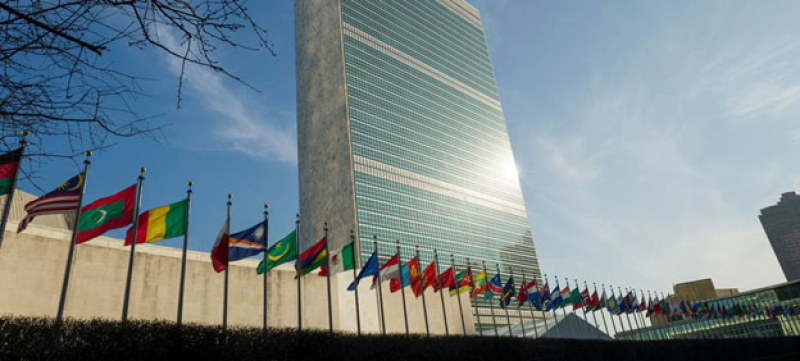- India Sees 9% Drop in Foreign Tourists as Bangladesh Visits Plunge |
- Dhaka Urges Restraint in Pakistan-Afghan War |
- Guterres Urges Action on Safe Migration Pact |
- OpenAI Raises $110B in Amazon-Led Funding |
- Puppet show enchants Children as Boi Mela comes alive on day 2 |
UN80 “Slash and Burn” Reforms Face Heavy Criticism

The Secretariat Building at United Nations Headquarters, in New York.
“We are writing to you regarding the cuts being undertaken under the UN80 Initiative and, more broadly, across the UN system. While we are mindful of the current funding challenges, we believe that the rushed and chaotic manner in which these changes are being implemented is causing deeper harm to both the effectiveness and reputation of the United Nations.
The “slash and burn” approach adopted under the UN80 plan, led by Mr. Guy Ryder, adviser to the Secretary-General, risks not only damaging our mission and harming our beneficiaries; it is also proving costly at a time when the Organization can least afford it. Furthermore, many of the changes are likely to be reversed in the future, as the next Secretary-General works to re-establish coherence and relevance within the system.
In terms of the mission of the United Nations, the consequences of the lack of funding are already stark. An evaluation of the impact suggests that 23 million fewer people affected by humanitarian crises will receive assistance. There could be 4.2 million additional AIDS-related deaths. It means millions of children are at risk of being pushed out of school— with an estimated 250,000 in Sudan alone.
It also means that support for the energy transition, development financing, and counterterrorism efforts will be weakened. While developing countries will be the first and hardest hit, many of these impacts will be global. As noted by outgoing UNDP Administrator Achim Steiner in the Financial Times, we are witnessing a “structural destruction of capacity.”
The funding cuts are already causing serious harm, with experienced frontline workers— especially national staff in developing countries—being dismissed with little notice, as well as international colleagues who have served in some of the most complex and high-risk environments.
The management of the UN80 process under Mr. Ryder risks deepening the crisis and raises serious issues about coherence and vision. It begins with a poor understanding of mandates. For example, leaked proposals have suggested merging the United Nations with the World Bank and International Monetary Fund, an idea that is not only unfeasible but fundamentally misunderstands the roles of these institutions.
Even for those organizations more integrated within the UN system, no thought has been given to how these ideas could realistically be implemented, or to the appropriate role of Member States. For instance, the suggestion to merge the United Nations High Commissioner for Refugees and the International Organization for Migration would weaken rights protections under the 1951 Refugee Convention.
These proposals also reflect the arbitrary way task force members were appointed, meaning that some entities and development mandates are voiceless in the process. We see a risk that some senior managers will seize the opportunity to expand their own entities at the expense of others.
In a recent staff townhall, Mr. Ryder admitted that the reform process is being conducted “back to front,” as strategic decisions will only be made after there has been a 20% ‘across the board cut’ of Secretariat posts within the United Nations, adding to the thousands of positions across the wider UN system.
This means that while discussions under UN80 are ongoing, managers are being forced to make difficult and unnecessary choices without a clear rationale. This rushed approach also carries significant financial costs.
We estimate that each staff termination or relocation costs $100,000 once indemnities, relocation, and training are factored in. Across the system, this will amount to a minimum of $930 million in costs to Member States, with no suggestion of how this will be paid for. As seen in previous rushed downsizing efforts, new staff will quickly have to be (re)hired, incurring further expenses.
We have urged Mr. Ryder, once a respected champion of social dialogue, to begin by identifying how the strengths of the UN system can be aligned with the needs of our beneficiaries to maximize impact at both the global and country levels, and make the UN fit for the future.
Reform should be guided by these principles and informed by inclusive consultation, recognizing that colleagues on the ground often have a more accurate understanding of how the UN operates, rather than senior management in New York.
Unfortunately, our appeals have gone unacknowledged. We therefore hope that you, the Member States, will scrutinize the UN80 process thoroughly; consider the damage it may inflict on the effectiveness of the United Nations; and support a more strategic and sustainable approach to restructuring and financing the UN system.”

